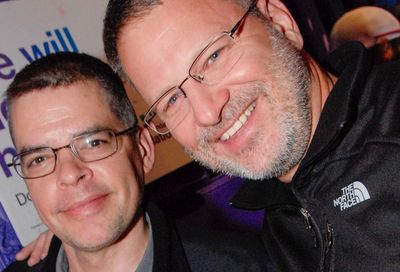The Cost of 'Don't Ask Don't Tell'
Commentary: OutRight
A new study from the University of California estimates the financial costs of the military’s “Don’t Ask, Don’t Tell” policy, under which more than 10,000 gay service members have been discharged since 1994. The total estimated cost of about $363 million for the first 10 years of the policy (1994-2003) is a low-ball figure, according to the study. While that figure is not much in relation to the gargantuan annual federal budget of $2.7 trillion, any amount spent on excluding otherwise eligible Americans who want to serve — especially in wartime — is a waste of taxpayers’ money.
The report breaks down the financial cost of firing service members for homosexuality under DADT into four discrete categories: recruiting costs for enlisted service members; training costs for enlisted service members; training costs for officers; and separation travel costs. Let’s take a look at each of these:
Recruiting costs for enlisted service members fired for homosexuality: $79.2 million.
The military spends a lot of money to recruit. Some of this money is spent to recruit service members who are eventually fired for homosexuality. In a February 2005 report tellingly entitled “Financial Costs and Loss of Critical Skills Due to DOD’s Homosexual Conduct Policy Cannot Be Completely Estimated,” the congressional Government Accountability Office (GAO) estimated these costs attributable to DADT at $95.4 million. The UC commission actually revised this estimate downward to account for value the military recouped through time served by service members before discharge.
Training costs for enlisted service members fired for homosexuality: $252.3 million.
Once the military recruits a person for service, it invests even more heavily in both basic and initial skills training. The GAO estimated the cost of training recruits fired for homosexuality to be $95.1 million.
This is almost certainly a large underestimate of the cost of training these recruits, for a couple of reasons. First, the GAO number does not reflect training costs for Marines discharged for homosexuality (since the Marines apparently did not provide GAO with training estimates). Second, even the GAO’s training cost figures for the other services are substantially lower than the GAO’s own previous estimates of training costs and estimates available in other public sources. The UC commission corrected the GAO figures by relying on the Defense Department’s and GAO’s own previous figures for both basic and initial skills training for each of the branches. After that, the commission again credited the military for recovering at least a part of this cost through the member’s service before discharge.
Training costs for officers: $17.7 million.
The GAO report did not factor the cost of training officers into its report. In the first 10 years of DADT, 137 officers were discharged for homosexuality.
The UC commission estimated the cost of training for officers who go through one of five different routes: service academies (like West Point), ROTC, Officer Candidate School, direct appointment, and other paths.
Separation travel costs: $14.3 million.
Recruiting and training costs are front-end. They occur at the beginning of a military career. There are also costs associated with separation from the military, the back-end of service. These “out-processing” costs are numerous and are also investments the military must make when it discharges a member. One such cost is travel expense. The UC commission estimated this cost of DADT by using the Army’s own lower-range estimates for such travel costs, and deducting for recovery of costs through time served.
Putting all these numbers together, we arrive at a total cost of $363,770,279 to implement DADT during its first 10 years.
Several factors suggest that the UC commission estimate is still a substantial underestimate of the real financial cost of expelling gay service members. First, the commission could not get numbers estimating the costs of discharge review boards, security clearances, out-processing costs, investigations into service members’ sexual orientation, re-enlistment bonuses, and officer recruiting. Second, the estimates of officer training are probably much lower than the actual cost. The types of officers fired for homosexuality include physicians, pilots, dentists, and other individuals with high-cost technical training. Third, the estimate does not include the cost of losing gay service members who refuse to re-enlist after fulfilling their service obligations because they are unwilling to continue to conceal. Fourth, the estimates for enlisted training are probably too conservative.
On the other hand, the UC commission does not attempt to calculate the cost of recruiting and training service members who might disdain military service if the ban is lifted. I doubt this would be a large cost, since open homosexuals would be such a tiny portion of the military services, and whatever the initial cost it could be expected to dwindle as military culture adjusted. The experience of other countries does not indicate any recruitment and retention difficulties attributable to allowing service by openly gay service members.
Finally, “financial costs” alone do not measure all the costs — in broken careers, broken lives, broken families, in the dignitary loss to gay Americans in general — of having a policy that expels Americans who want to serve their country simply because we learn they’re gay. But we cannot have a debate over the costs and benefits of DADT without at least a reasonable baseline estimate of the financial costs. For that reason, the UC Commission has made what appears to be a useful and important contribution to the debate.
Dale Carpenter is a law professor. He can be reached at OutRight@metroweekly.com.
Support Metro Weekly’s Journalism
These are challenging times for news organizations. And yet it’s crucial we stay active and provide vital resources and information to both our local readers and the world. So won’t you please take a moment and consider supporting Metro Weekly with a membership? For as little as $5 a month, you can help ensure Metro Weekly magazine and MetroWeekly.com remain free, viable resources as we provide the best, most diverse, culturally-resonant LGBTQ coverage in both the D.C. region and around the world. Memberships come with exclusive perks and discounts, your own personal digital delivery of each week’s magazine (and an archive), access to our Member's Lounge when it launches this fall, and exclusive members-only items like Metro Weekly Membership Mugs and Tote Bags! Check out all our membership levels here and please join us today!




















